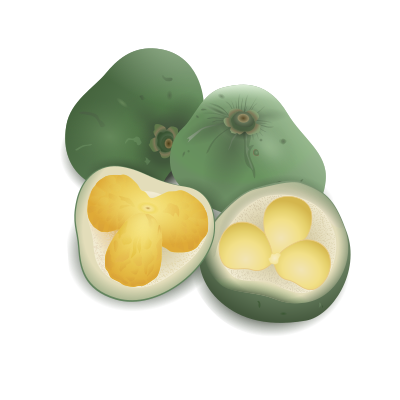Caryocar brasiliense, known as pequi or “souari nut”, is a native fruit from Brazil, found in the Amazon, Caatinga, Cerrado and Atlantic Rain Forest regions. The pequi tree grows up to 10 m (30 ft) tall. The yellowish-white flowers are hermaphroditic and bear many stamens. There are often two dozen or more flowers per inflorescence. Fruits start off dark purple, turning olive green and finally buffy green as they ripen, taking about 5–6 months. Ripe fruits are about the size of an orange. They have a few (usually 1-4) segments of pulpy pericarp inside the skin, yellow and with a typical strong taste and smell mixing sweet, fruity and cheesy aromas.
The Pequi tree has great economic and subsistence values for many communities living in the Cerrado that covers approximately 22% of Brazil. Pequi fruits can be consumed fresh or as jams, jellies, liqueurs, creams and oils and their leaves are also used in folk medicine for treating respiratory diseases or manufacturing cosmetics products. In addition to the ethnobotanic and ethnoecological investigations with C. brasiliense, other studies show anti-inflammatory and antioxidants properties of the oil extracted from the Pequi pulp.


